A Time for New Dreams Read online
Page 3
There is a hint of immortality in all portraiture. The subjects live, in another dimension, alien to us. They live, but they are motionless. Time has gone from them, yet still they persist in time. They live in an enigma.
Does their image differ from the memory we have of them? Is memory truer?
Portraiture suggests a parallel memory in the universe, in which all things persist. Photography touches us so mysteriously because we have an intuition that all things are remembered in some invisible place beyond dreams, where everything that was exists in a sort of universal, divine amber.
Many wonderful notions ought to flash past one’s mind in the presence of these people upon whom time has wrought an enchantment.
*
Portraiture ought to remind us that we live between two enigmas, birth and death. Photography is the dream, the interval, which we take to be the real.
And yet secret tears flow behind these portraits. We too will be like them.
But we have lost our innocence. Otherwise these images ought to start in us a new philosophy of living, a new simplicity, and maybe even a new happiness.
Hospitality
1
Hospitality begins in the soul.
2
Hospitality is more than a rational, deliberate act. It is a way of being.
3
Hospitality ought to be built into a people’s way of living.
4
A people can only live the art of hospitality if they transform what they are.
5
Hospitality is not a habit. It is a genius of self that recognises the genius of other selves.
6
Hospitality takes us back to the root of humanity, the source of rivers.
7
Hospitality is not tolerance or charity, nor is it weakness. Hospitality can only come from the true strength of knowing what one is, and the tranquillity of allowing other people the strength of what they are.
8
Hospitality is a secret affirmation of the oneness of humanity, a sort of secular kinship. Hospitality is something we should be able to extend not just to our friends, but even to our enemies.
9
The idea of hospitality is challenged most when we are dealing with the unknown. It means that we have faith first even before we have evidence.
10
The ideal of hospitality does not die even when it has been betrayed, but is only made wiser.
11
Hospitality requires courage and wisdom.
12
According to Lao Tsu the truest hospitality is when the host is like a guest, and the guest like a host.
13
The limits of hospitality were revealed most in colonialism. We all know what happened to the hospitality of the Incas towards the Spaniards, and the Africans towards the Europeans. The Incas were slaughtered, robbed, and became victims of genocide. And the Africans still have not recovered from that early foolish kind of hospitality where the host is ignorant about the world and the true intentions of the visitors.
14
Hospitality has to be both wise and sane.
15
Philosophically there is no such thing as hospitality because we are all guests on this planet, we are all guests in life.
16
Didn’t Auden say about Yeats when he died, ‘Earth receive an honoured guest’?
17
In fact it is quite possible that we are guests in the universe and guests in the condition of mortal consciousness.
18
Hospitality is therefore temporary, finite, and subject to the continual changes of the human condition.
19
Today I am a guest, tomorrow I am a host.
20
There is also intellectual hospitality, the hospitality to ideas, to dreams, to ways of seeing, to perception, to cultures. We will call this invisible hospitality. This is the most important hospitality of all and it includes all other hospitalities.
21
Beyond that we are talking about the hospitality of the infinite, which should be pursued in silence and through initiation, following a secret path towards the eternal.
O, Ye who Invest in Futures
1
It is easy to dismiss Africa. It is easy to patronise Africa. It is easy to profess to like Africa. It is easy to exploit Africa. And it is easy to insult Africa.
But it is difficult to truly see Africa. It is difficult to see its variety, its complexity, its simplicity, its individuals. It is difficult to see its ideas, its contributions, its literature. It is difficult to hear its laughter, understand its cruelties, witness its spirituality, withstand its suffering, and grasp its ancient philosophies.
Africa is difficult to see because it takes heart to see her. It takes simplicity of spirit to see her without confusion. And it takes a developed human being to see her without prejudice.
2
Africa is a challenge to the humanity and sleeping wisdom of the world. It is an eyeball-challenging enigma. Africa reveals what most hides in people. It reveals their courage or cowardice, their complacency or their conscience, their smallness or their generosity. Faced with Africa, nothing of what you truly are can hide. Africa brings to light the true person beneath their politeness, their diplomacy, or their apparent good intentions.
Africa is the challenge of the human race in the twenty-first century because, through her, humanity can begin to feel at peace with itself. Africa is our conscience. There can be no true progress for humanity till the sufferings of our brother and sister continents are overcome, till people everywhere live reasonably good lives, free from vile diseases, undernourishment, illiteracy and tyranny.
3
There is another sense in which Africa – for those who do not know her – is difficult to see. To see Africa one must first see oneself.
The laziness of the eyes has to go. It won’t do any more to let our hearts and minds be affected by the colour of someone’s skin. This problem, amazingly, is still here. It is one of the silent tragedies of our times. It prevents people making true friends. It prevents them reading the literature of others. It hinders the flow of ideas and the mutual enrichment of our lives. More often than not culture is colour-biased. We are still primitives in the art of being human.
4
This is what gives literature its great importance. Literature makes it possible to encounter others in the mind first. Literature is the encounter of possibilities, the encounter of the work and the heart. It is the true ambassador of the unity of humankind.
5
When I visit the houses of acquaintances a cursory glance at their bookshelves reveals everything I need to know, regardless of what they profess.
It is easy enough to have bookshelves weighed down with formidable rows of Shakespeare, Dickens, Jane Austen, Thomas Hardy, or Henry James, and all else that has acquired the patina of the classical. It is easy enough to have a fashionable collection of writers we deem to display a progressive tendency, alongside the popular books of the day.
But to have novels by Ukrainians, Iranians, Indians, Egyptians, poems by an unknown Samoan, a Dutch collection of stories, works by Kenyan, Nigerian, Jamaican novelists, plays from Portugal, Japanese elegies, all mixed in with books that reveal a healthy interest in what the human spirit is dreaming; now that is something special. For here would be a person that Goethe would have called a citizen of the world. Here would be a person one would want to have as a friend, a person keen on humanity, fascinated by its varied genius.
6
That’s what this is about: celebrating the genius of human diversity. The idea is to enrich the world by its greater contact with Africa, and to enrich Africa by its greater contact with the world. The dream is to create a bridge of the imagination. The hope is to share in the fun and the marvel of the creative spirit.
7
It is not enough just to pass one’s eyes over the words, to read literature passively. T
hat would be like what Mozart said about his mother-in-law: ‘She would see the opera, but not hear it.’ We should read this literature with an open mind, an intelligent heart.
True literature tears up the script of what we think humanity to be. It transcends the limitations we impose on the possibilities of being human. It dissolves preconceptions. True literature makes us deal with something partly new and partly known. That is why we can’t ask new literature to be like the old, to give us the same pleasures as those that have gone before. That wouldn’t be living literature, which surprises and redefines. That would be mere repetition.
Literature mirrors, reveals, liberates.
8
Literature from Africa has long been in the margins. One of the benefits of this is that it has much to do. It has so many new moods, possibilities, philosophies to bring into being. This literature will bring many unsuspected gifts and wonderful surprises to the world in the fullness of time.
9
O, ye who invest in Futures, pay heed to Africa. Today she is wounded and is somewhat downcast. But tomorrow she will flower and bear fruit, as the Nile once flowered into the Pyramids, or like the savannahs after the rains.
10
Africa has a weird resilience. Her future bristles with possibilities. When she heals, Africa will amaze.
Dramatic Moments in The Encounter between Picasso and African Art
An Essay in Ricochet
Encounter
When he saw the masks he was shattered by the original flash of lightning, with its zigzag out of nothing. A howl and a laughter as mysterious as the map of Africa clouded his mind.
In that moment all of ancient Spain died and was resurrected in a new form. The golden proportion perished and was reborn in an obscure dance in the dark. The tentative perfection of Raphael, the exquisite mystery of Da Vinci, the electrified gap between the outstretched finger of an indolent Adam and the life-giving power of the original father, all were destroyed and remade in a miraculous exchange of energy.
In that moment the mass of the past was multiplied by a consciousness illumined by the speed of light squared. And in less than a moment he beheld an image in the dark that confronted two thousand years of beauty.
In that flash of a moment a wild new symmetry was born. A savage new aesthetic came into being. A new century and a new world dawned.
The ancient masks confounded, at a stroke, the reasoning that had enslaved their makers and blurred the God that had destroyed the gods. And a new religion without a name would haunt the eyes of the Western dreamers as a revenge for the enlightenment that went wrong. An enlightenment that, as well as liberating, also created a new slavery, a new darkness.
And so for the first time in centuries the different sides of the spirit of man collided. In that fusion the unstable reign of beauty came to an end. It was no longer sustainable in a world where men had killed God in their hearts. An implosion of energy took the form of a possession. A howl and a jubilation of destruction, a cry of power from the future throat of the blinded minotaur, seized the young man in a grip so pure that for a moment he was blinded by the masks.
He saw the world with their eyes. He understood the meaning of his life and his vocation. He grasped the true mystery and necessity of art. He became its willing and fortunate slave. He became the high priest at the shrine of an unknown god. And he was blessed with the ambiguous power he so craved over the minds of men.
He had been touched into life by the ancient myth of the superman and by the brilliant angel of the beautiful darkness. A darkness that was, in truth, a new light.
All this took less than a moment.
The moment when his eyes gazed, for the first time, at the masks.
Possession
They had been whispering among themselves, the masks and sculptings. The spirits had been in great dialogue with one another. They had been debating how best to get their weird wisdom to enter into the broad stream of humanity. They debated how to make their mysteries alive in the new times. How to be valuable among people who were at a crossroads, and who had come to the end of a way of seeing.
The masks ceased their whispering when a young Spaniard came amongst them in the museum where they dwelled. The Spaniard had fierce eyes and his soul was hungry for newness and for a sorcerer’s power. This was a young man crowded with questions.
The spirits ceased their speech when they beheld the young Spanish painter who had already made a pact with an unknown divine force that he would give up art if someone he loved, who was ill, was spared from death. But the divine force, in infinite wisdom beyond cruelty, had seized the life of the loved one, and left the young painter with an immortal contract. He must create art, or die. He must create great art or suffer eternal perdition of the soul for not fulfilling his pact with the eternal powers.
The spirits beheld this troubled and deeply hungry young artist and they knew they had found what they were seeking. The foundations of art were deep in him. His psychic frame was tough. And yet he had great spaces in him, gaps craving a new way. The spirits knew what they must do. They would possess this young artist’s soul. They would infect his spirit with new vision. They would use him to make their secret ways and higher energies known to the world, in the new age. Among strangers who had almost lost the sense of wonder, they would be the annunciation of an oblique golden age.
And so, in silence, and as one, the spirits leapt into the young artist’s eyes, into his blood, and nestled in his soul. They took over his art, and seized the power of his hand. Being more powerful than his young will, they made him do what they wanted him to do, but through the filter, the mediation of his rich artistic sensibility.
From that moment, he fell into a dream, an obscure possession. He was never his old self again, as an artist, or a man. And to survive henceforth, he condemned himself to the necessity of perpetual transformation, trying to escape that which had already changed him, and would go on changing him for as long as he lived.
Thus two destinies were fulfilled. The destiny of the masks to alter the art of the world. And the destiny of an artist to fulfil his pact with the ambiguous powers of the universe…
*
Afterwards, when the artist woke from the dream, from the possession, he found all these works he had created. No one understood them for many years. They were enigmas.
He could never satisfactorily explain how they had come to be. For the magic of that moment never happened again. All the words of denial and affirmation he used to explain the mystery of his artistic discoveries only made the mystery more strange…
Meanwhile, the spirits and the masks had moved on. They took their secrets with them into the depths of their unfathomable African silence. There the truth of things resonates in eternal renewal among the gods.
Obsession
I’ve got to do something amazing or die. I’ve got to seize my power or be destroyed. I’ve got to stage a coup against life, against the past, against beauty, against poverty, against love, against death, against failure, against the ancients, against the ancestors, against the future, or I’ll perish.
I’ve got to find a new power. I’ve got to find a new source. I’ve got to find, I’ve got to find, I’ve got to find, or I’ll never live. I’ve got to find freedom. I’ve got to breathe a new air. I’ve got to find a new world. I’ve got to find a new consciousness. I’ve got to find a new continent. I’ve got to find new eyes. I’ve got to see with new eyes.
I’ve got to find a new beauty, a new religion, a new dawn, a new faith, a new family, a new time, a new energy, a new life, a new body, a new sex, a new laughter, a new mystery.
I’ve got to find a new creation. I’ve got to find a new beginning. I’ve got to find a new art, a new now, a new present without a past and without a future, an eternal present always present.
I’ve got to find a new fame. I’ve got to find what no one has found and what no one will find again. I’ve got to find the unfindable, or I am finished, or
I am unbegun, I may as well die, but I can’t die, I won’t die. I’ll wrestle with eternity if I have to. I’ll wrestle with the angels of light and darkness if I must. I’ll exchange my blood for a new blood made of the ink and oils of a new art. I’ll do a deal with the dark one himself and I’ll wriggle out of his claws if I have to. But I’ve got to find, for I feel death on my back, the death of all that’s gone before that will not last the new harsh light that we have made to chase away the mysteries.
I’ve got to do something to split time apart. I’ve got to do something to split life into its splinters of pure beauty, the beauty of a new source of energy for the mind’s eternal delight.
I’ve got to do something astonishing, for I am being destroyed by the ancient fathers. I’m being destroyed by two thousand years of beauty and tradition and unfreedom. I’m being destroyed by reason. I’m being destroyed by faith. I’m being destroyed by materialism, and by science. I’m being destroyed by the Church and its dogmas and its incomplete truths about the true mystery and meaning of it all. I’m being destroyed by art, by literature, by the academies, by the Renaissance.

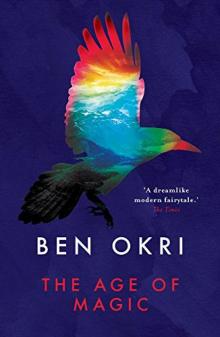 The Age of Magic
The Age of Magic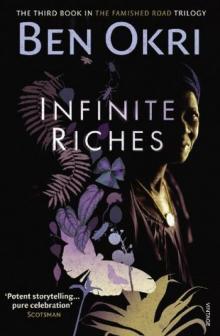 Infinite Riches
Infinite Riches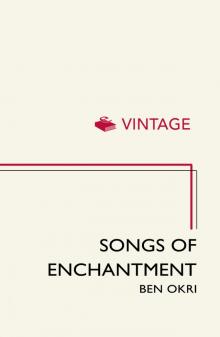 Songs of Enchantment
Songs of Enchantment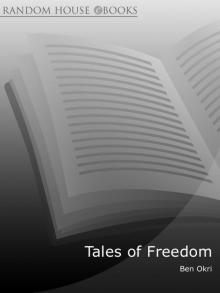 Tales of Freedom
Tales of Freedom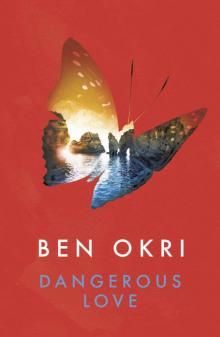 Dangerous Love
Dangerous Love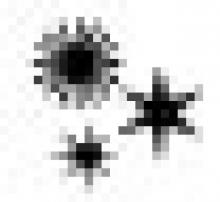 Starbook
Starbook The Famished Road
The Famished Road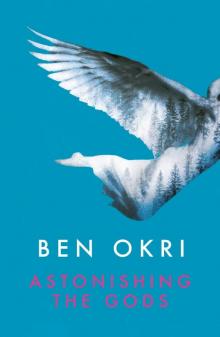 Astonishing the Gods
Astonishing the Gods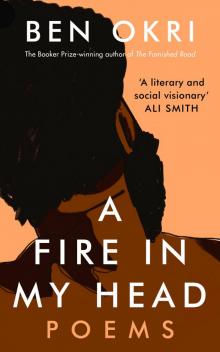 A Fire in My Head
A Fire in My Head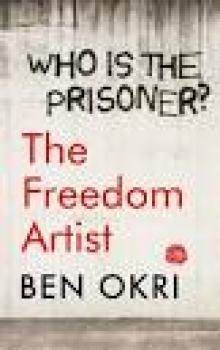 The Freedom Artist
The Freedom Artist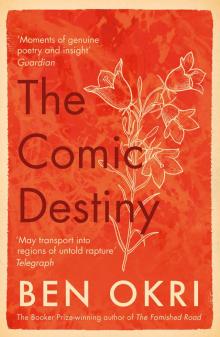 The Comic Destiny
The Comic Destiny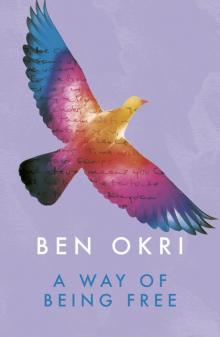 A Way of Being Free
A Way of Being Free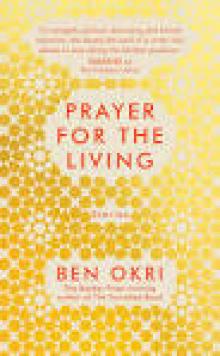 Prayer for the Living
Prayer for the Living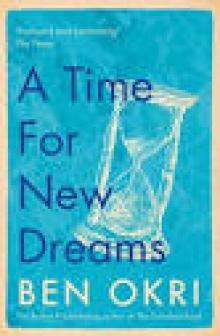 A Time for New Dreams
A Time for New Dreams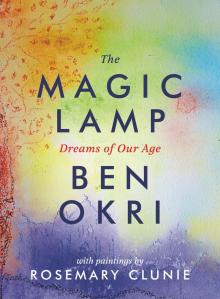 The Magic Lamp
The Magic Lamp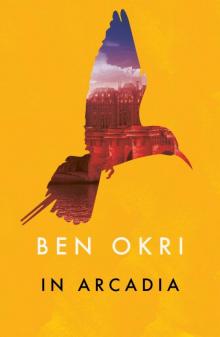 In Arcadia
In Arcadia